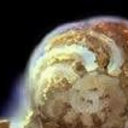Supplementation with compound polysaccharides contributes to the development and metabolic activity of young rat intestinal microbiota.
キーワード
概要
Dietary intervention during early life has a significant impact on colonization of the gut microbiota. In addition, some polysaccharides have the potential to selectively stimulate the growth and metabolic activity of intestinal bacteria associated with health and well-being. However, less is known about the effect of polysaccharides on the development of gut microbiota in younger individuals. This study was conducted to investigate the health effects of supplementation with dietary compound polysaccharides (Lycium barbarum polysaccharides (LBP), Poria cocos polysaccharides (PCPs) and Lentinan, 1 : 1 : 1) on the intestinal microecosystem and metabolism of young rats. Male 21-day-old Sprague-Dawley rats received daily intragastric administration of either compound polysaccharides (three dosages, 6 g kg-1, 12 g kg-1 or 24 g kg-1) or saline for 28 consecutive days. 1H-NMR spectroscopy integrated with multi-variate pattern recognition analysis was applied to reveal the metabolism of the host and microflora, while 16S rRNA gene sequencing was used to monitor the dynamic changes in the gut microbiota. The relative concentrations of 35 urinary metabolites and 24 faecal metabolites were significantly changed compared with the control group. 16S rRNA analysis showed that the relative abundances of 4 bacterial genera (Bifidobacterium, Lactobacillus, Allobaculum and Oligella) significantly increased, whereas the relative abundance of 1 bacterial genus (Enterococcus) significantly declined in the compound polysaccharide-treated groups compared with the control group. Meanwhile, dietary compound polysaccharide treatment promoted the functional maturation of the gut bacterial community, characterised by increased basic metabolism (amino acid metabolism and energy metabolism), short chain fatty acid (SCFA)-related metabolism and nucleotide metabolism. These findings suggest that compound polysaccharides may help to promote the colonisation and functional maturation of infant intestinal microbiota and maintain the health of the intestinal microecosystem.




